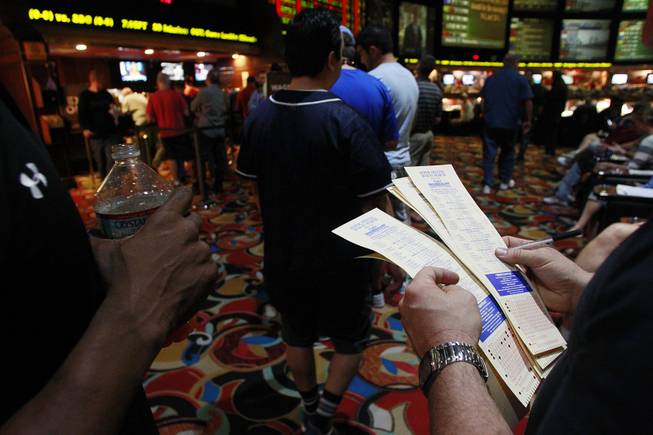
Las Vegas Sun
Bettors stand in line to make their wagers at the LVH sports book during the second round of the NCAA basketball tournament Thursday, March 20, 2014.
Thursday, Nov. 13, 2014 | 1:43 p.m.
Jimmy Vaccaro never had to go far to find some action in the Pennsylvania town where he grew up. Even as a teenager he knew the bookie in the backroom of the local candy store, where the cigar smoke was thick and bets could be made on any game in the country.
Vaccaro's fascination with betting would lead him to this gambling town, where he quickly found work in legal shops that didn't have anything to hide from the authorities. He's run some of the Strip's biggest sports books, and taken the kind of bets that can make even a legitimate bookmaker lay awake at night.
Now he's rooting for New Jersey to beat the odds by legalizing sports betting and doing away with the illegal neighborhood bookie once and for all.
"Everything we do is transparent, the rules and regulations are on the wall," said Vaccaro, oddsmaker at the South Point hotel-casino in Las Vegas. "The customer is well protected. That doesn't mean he wins every decision, but he has a place to go if there are any disputes."
A federal judge will hear the arguments next week on New Jersey's latest effort to open betting windows for sports fans. It's the same judge who last year ruled in favor of the four major sports leagues and the NCAA and issued an injunction preventing New Jersey from offering sports bets.
This after New Jersey voters spoke loudly by approving sports betting in 2011, and the state followed by enacting legislation to offer it at race tracks and Atlantic City's casinos.
The leagues have again trotted out the same absurd arguments about being harmed by fans being able to wager a few bucks on their games. But those fears of shadowy bookies fixing games are long outdated, and that legal sports betting is no more of a threat to major sports than playing the stock market is to major corporations.
"It's a different world, everything is different," Vaccaro said. "They're not even in the 21st century with the way they think."
Just how different that world is these days was evident Wednesday when the NBA announced it was entering a partnership with a fantasy sports website to offer daily games. As part of the agreement, the NBA gets an equity stake in FanDuel, a site that offers winnings every day to those who invest their own cash to try and build a winning team.
The NHL entered a partnership of its own with a daily fantasy site, hooking up with DraftKings as the official sponsor of its games.
It's not technically sports betting, but it's awfully close. Just like betting on a game, there's potential to win big money, and an even greater potential to lose that money. Worse yet, it's done without any governing body overseeing it to make sure players aren't fleeced.
Interestingly enough, it was the sports leagues themselves that ushered the fantasy sports exemption through the 2006 anti-gambling legislation passed by Congress. Their argument was that assembling teams to win contests wasn't akin to sports betting because it takes a certain level of skill to put teams together.
Yet the same leagues are in court trying to stop New Jersey residents from using their knowledge of sports and betting a few bucks on the Jets or Giants. And judging from earlier rulings by U.S. District Judge Michael Shipp in favor of the leagues, the odds have to be in favor of them succeeding.
"More legal gambling leads to more total gambling, which in turns leads to an increased incentive to fix plaintiffs' matches," Shipp said in an earlier ruling on behalf of the leagues.
Total nonsense, of course, since there is almost no way imaginable to fix an NFL game. No one has even made a real attempt in an era when half-point fluctuations in any line immediately are noticed everywhere from the sports books to the stadium.
So what exactly is the point? What is it that the leagues — particularly the NFL, which wouldn't be nearly as popular as it is today without the point spread — have to fear about sports betting?
And while we're at it, why does the NFL keep putting games in London, when there is a sports book on almost every corner offering bets on it? Can you spell hypocritical?
NBA Commissioner Adam Silver recently said he had no real problem with betting, and saw a way the league might take a cut of the action in the future. His comments suggested a change in attitude, though it's notable the league's lawyers are still battling against betting in New Jersey.
Those changes are overdue. It's time for sports betting to come out of the smoke-filled back rooms and enjoy the same legitimacy the leagues are so eager to give the fantasy sites.
This is, after all, the 21st century.

Join the Discussion:
Check this out for a full explanation of our conversion to the LiveFyre commenting system and instructions on how to sign up for an account.
Full comments policy